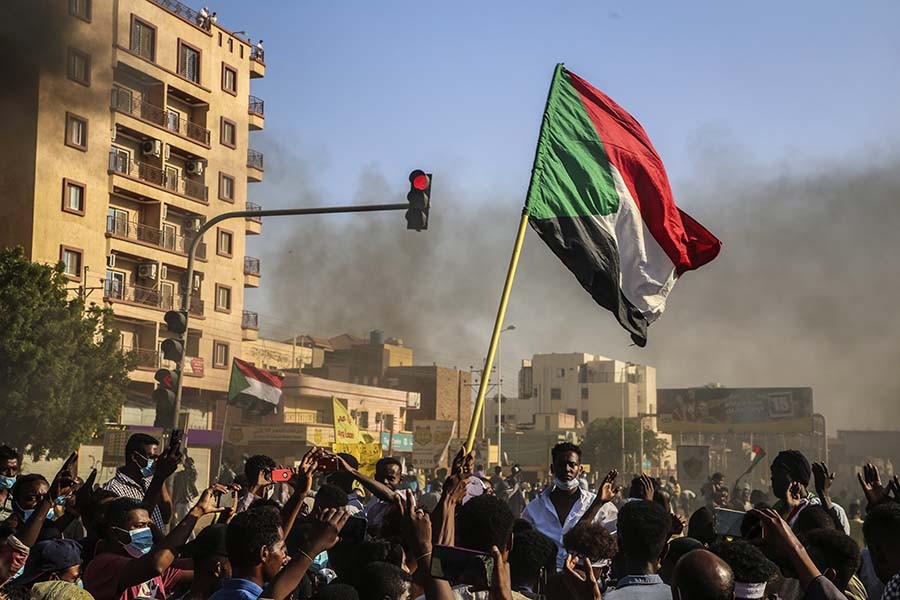The toppling of the three decades old rule of Field Marshall Omar Hassan Ahmad al-Bashir on April 2019 was widely celebrated as a victory of Sudan's popular democratic forces against the military dictatorship. Though it was a months-long bloody popular struggle that finally brought down Omar Bashir's authoritarian and corrupt regime, the government that replaced it -- the Transitional Military Council TMC) -- was again a military-led government. General Abdul Fattah al-Burhan was now in charge. Despite the takeover by TMC, a product of the popular movement, the street demonstrations against the incumbent government continued at the call of the Sudanese Professionals Association (SPA) for handing over power to a civilian authority. In fact, the popular movement against former president Omar al-Bashir that started in December 2018, called Sudanese Revolution, was never free from the grip of the Sudanese military. Even two months and a half into the much celebrated April 2019's changeover, the Khartoum massacre took place killing over 128 people. And the carnage was carried out by the infamous paramilitary force, the Rapid Support Forces (RSF), which grew out of the notorious Janjaweed militias who were involved in the ongoing war in Darfur in Western Sudan and committed untold crimes against the rebel non-Arab herders there. Now in RSF's garb, the same militias attacked the rallying Sudanese people, mostly youths, during their peaceful sit-in demonstration. Their rallying cry included the already too familiar demand for replacing the ruling military-led TMC with a full, civilian one. So, there was nothing new or radical in their demands to provoke the security forces to pounce on the demonstrators with disproportionate force. Clearly, the carnage of the Khartoum demonstrators was carried out in cold blood by the TMC. However, the process of the dialogue did not stop and the demonstrators, under the Forces of Freedom and Change (FFC), a coalition of all anti-Bashir forces of movement including rebel political, social, professional and rights groups, signed a power-sharing agreement with TMC as a step towards transitioning to democracy. The political deal was followed by August 4, 2019's Draft Constitutional Declaration or Draft Constitutional Charter. Ironically, the signatory of the Charter from the TMC's side was Mohammed HamdanDagalo, the head of the notorious killer force, RSF. Notably, the signatory on behalf of the FFC was Ahmed Rabee, a school teacher. FFC's choice of a school teacher to represent them tells the whole story about who constitute the Sudanese anti-military junta movement. The signing of the Draft Constitutional Charter took place before international observers from the African Union and Ethiopia. According to the agreements, the power was subsequently to be handed over to the newly formed Sovereignty Council and to other transitional state bodies.
The headline of a news report carried by CNN on August 17 went like this, "Sudan just got a step closer to full democracy,"though the headline did not forget to add, "Big obstacles remain'. It shows how optimistic the international community was about Sudan's transition to democracy.
But the understanding, fragile from the beginning, did not last long. General Burhan, scrapped the entire deal and grabbed power. Upon seizing power he dissolved the Sovereignty Council, declared state of emergency and interned civilian Prime Minister Abdallah Hamdok and other ministers. The fallout from the October 25 coup d'état has been that more and deadlier protests against the junta have begun. The Sudanese security forces' action against the protesters in North Khartoum on November 17, for instance, cost some 16 lives, according to medical workers. As expected, the international community has strongly condemned the bloody attack by Sudanese security forces on the peaceful demonstrators. However, in a fresh turn of events on Sunday, General Abdel Fattah al-Burhan's military junta has reinstated the ousted and interned Abdulla Hamdok in his previous position as prime minister in what media reports say 'a new power-sharing agreement' with the General Burhan. Hamdok is reported to have signed the new agreement to stop more bloodshed, though it is feared, he has done it under duress. Political observers are sceptical about the junta's real intention behind it latest move.
The protestors, however, expressed their resolve to continue struggle until full civilian authority is established. The world powers need to act forcefully, rather than just condemn Sudanese military's excesses against the civilian population of that country.


